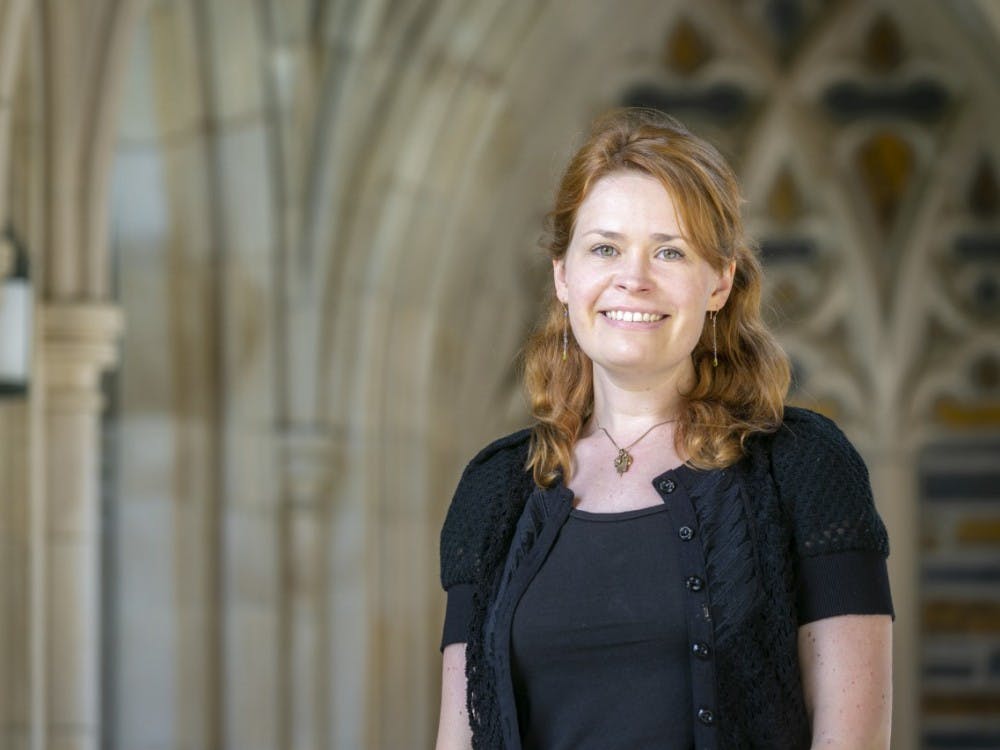Elizabeth Schrader was a singer-songwriter for 12 years until she wrote a song about Mary Magdalene—the Jewish woman who witnessed Jesus Christ’s crucifixion, burial and resurrection—that inspired her to change careers.
Schrader, Ph.D. candidate of early Christianity in the religious studies department, has made waves with her research on Mary Magdalene and the Gospel of John. This summer, she visited Germany to discuss her research with the editors of the Nestle-Aland Greek edition of the New Testament, the critical edition of the Greek text that is the “industry standard” for biblical scholarship, she said. The editors will take her work into consideration as they prepare for the 29th edition.
“I wrote this song about Mary Magdalene, and it caused me to want to look at the oldest copy of the Gospel of John to see if there was anything strange around Mary Magdalene’s figure,” Schrader said. “I was a layperson. I was a musician. But I was curious if I might find anything.”
After obtaining an online translated transcription of Papyrus 66, the oldest copy of the Gospel of John, Schrader discovered that the name Mary had been crossed out twice. The first time “Mary” was changed to say “Martha,” and the second time “Mary” was replaced with “the sisters.”
“It looked to my untrained eye that they were adding a character to the story,” she said.
This discovery led Schrader to pursue a master’s degree at the General Theological Seminary of the Episcopal Church, where she continued her research on the Gospel of John and learned ancient Greek along the way.
For her master’s thesis, she examined over 100 manuscripts, finding “dozens of manuscripts with problems around Martha.” Based on her research, Schrader concluded that Martha likely does not belong in the Gospel of John.
“You have to cobble it together from various manuscripts, but you can see a different version of the Lazarus story with Martha completely not there,” she said.
Schrader argued that Martha was taken from the Gospel of Luke and superimposed onto the Gospel of John so that Mary Magdalene’s original role was minimized.
“Once you take Martha from the Gospel of Luke, and you stick her in the Gospel of John, then Lazarus’s sister Mary isn’t Mary Magdalene anymore. Now’s she a different Mary. She’s Martha’s sister Mary from a different gospel from a different author,” Schrader said.
Mary Magdalene was a controversial figure, she explained. Early Christian scribes objected to “Mary and her authority.” To downplay her role, they introduced Martha so that “Mary” no longer meant “Mary Magdalene.” This textual change “dilutes” the role of Mary Magdalene and “takes her authority away,” Schrader said.
Schrader submitted her master’s thesis to the Harvard Theological Review, and it was published in July 2017. After its publication, she sent a printed copy of her article to Holger Strutwolf, head editor of the Nestle-Aland New Testament.
A year later, Schrader met Strutwolf at a biblical scholar conference where she presented as a part of a panel on textual criticism.
“When Holger Strutwolf came up to me, my jaw dropped,” Schrader said. “He was like ‘I really liked your presentation today and I got your article that you sent me. Have you found anything else?’”
This chance encounter laid the groundwork for Schrader’s July 2019 meeting with the editors of the Nestle-Aland New Testament in Münster, Germany. She was already going to be in Germany this summer to learn German for her doctorate. Consequently, the editors invited her to meet with them to discuss her research on Martha.
During the meeting, Schrader highlighted the “obvious and egregious change” in Papyrus 66 where Mary’s name is replaced with “the sisters,” which she said effectively means “a woman has been split in two.”
Although other scholars have made note of these changes in Papyrus 66, Schrader emphasized that she was the first to conduct an extensive study of these replacements across many manuscripts. The lack of previous research on the subject is likely due to the fact that biblical scholarship is a field dominated by men, she said.
Schrader encouraged women and people of color to learn ancient Greek and study the New Testament in order to diversify the field and bring more perspectives to it.
“We need women to look at these manuscripts because you cannot have an entire discipline, especially the discipline that determines what the text of the Bible is, to all be men,” she said.
Get The Chronicle straight to your inbox
Signup for our weekly newsletter. Cancel at any time.

